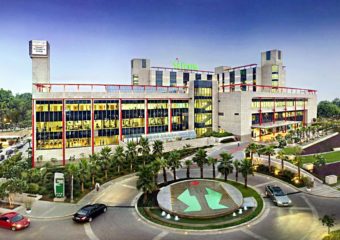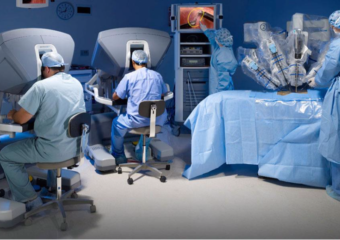High-Quality Best Gastric Bypass Surgery Cost in India
How Much Does Gastric bypass Surgery cost in India?
Many potential patients for surgery are concerned to know about Gastric bypass surgery cost in India? The estimated cost of Gastric bypass surgery in India usually starts $5000 however, it may go up to as much as $6,500. It depends on the hospital charges and the fee charged by the surgeon. This price usually does not cover the post-operational physiotherapy program. Additional costs also involve the diagnostics before the surgery and pre-operational consultations.

What is Gastric bypass surgery?
Gastric bypass surgery is the most common type of weight-loss surgery which helps to reduce weight. Gastric bypass and other types of weight-loss surgery, collectively known as bariatric surgery, make surgical changes to your stomach and digestive system that limit how much food you can eat and how many nutrients you absorb, leading to weight loss.
While that may sound appealing, gastric bypass surgery isn’t for everyone. Like any major procedure, it has significant health risks and side effects. In addition, the long-term success of gastric bypass surgery depends on your ability to make permanent changes in your lifestyle. When you want to be considered for gastric bypass surgery, you must undergo a thorough evaluation to determine if it’s suitable for your situation.
Advantages of Gastric Bypass Surgery
- Greater overall weight loss due to the tighter dietary restrictions and less caloric absorption.
- Faster initial weight loss.
- Your body helps direct healthier food choices because of strong discomfort caused by eating sugars, fats and carbs.
- 96% of health problems related to obesity are completely resolved or reversed quickly.
Disadvantages of Gastric Bypass Surgery
- Permanent change in your anatomy
- Restricts dietary choice for the rest of your life
- Dumping syndrome from eating foods high in sugar, calories and fat causes discomfort, 20-30 minutes of nausea, and possibly vomiting, diarrhea, and overall weakness each time.
How does a gastric bypass Surgery work?
Gastric bypass surgery done in two ways:
- It creates a small upper stomach pouch and a lower stomach pouch that is no longer used. This effectively reduces your stomach size so you eat small amounts of food.
- It allows the food you eat to bypass the majority of your stomach (the unused lower part of your old stomach) and small intestine so that the food you do eat is not fully digested.
The benefits of gastric bypass surgery are that weight loss tends to be rapid with good long-term results for many, and that patients often see swift improvements in obesity related health conditions. It requires a commitment to changing your eating habits and focussing on nutritious foods. You would need to take vitamins for life and have quarterly vitamin B12 injections. As with any operations, much of the success is dependent on your ability to change your lifestyle. Most patients find that the benefits of working with the operation are worth it and they really enjoy the new weight loss.

Who is the Candidate for Gastric Bypass Surgery?
- You may be an ideal candidate for gastric bypass surgery if you:
- Have a body mass index (BMI) of at least 35 (get a BMI estimate with our BMI calculator)
- Have a body mass index of at least 30 and have major obesity-related medical problems (e.g., diabetes)
- Patient age at least 18 years old
- Have attempted and failed to lose weight through diet and exercise
In general, appropriate gastric bypass surgery weight loss candidates include individuals with a body mass index (BMI) of at least 40, or those with a BMI of 35 or more who also suffer from at least one co-morbid condition related to obesity. (Obesity-related co-morbid conditions include type-2 diabetes, asthma, sleep apnea and more.) On the other hand, individuals who suffer from excessive (super) obesity and suffer from numerous medical co-morbidities might be too high of a surgical risk to undergo anesthesia and may not be suitable candidates for the procedure. Candidacy decisions are made on a case-by-case basis.
Before Gastric Bypass Surgery
Your surgeon will ask you to have tests before you Gastric Bypass surgery. Some of these are:
A complete physical exam.
- Blood tests, ultrasound of your gallbladder, and other tests to make sure you are healthy enough to have surgery.
- Visits with your Surgeon to make sure other medical problems you may have, such as diabetes, high blood pressure, and heart or lung problems, are under control.
Nutritional counseling.
- Classes to help you learn what happens during the surgery, what you should expect afterward, and what risks or problems may occur afterward.
- If you smoke, you should stop several weeks before surgery and not start smoking again after surgery. Smoking slows recovery and increases the risks for problems. Tell your Surgeon if you need help quitting.
Tell your surgeon
- If you are or might be pregnant
- What medicines, vitamins, herbs, and other supplements you are taking, even ones you bought without a prescription
During the week before your surgery
- You may be asked to stop taking medicines that make it hard for your blood to clot. These include aspirin, ibuprofen (Advil, Motrin), warfarin (Coumadin), and others.
- Ask your Surgeon which drugs you should still take on the day of your surgery.
On the day of surgery:
- Follow instructions about when to stop eating and drinking.
- Take the drugs your surgeon told you to take with a small sip of water.
- Arrive at the hospital on time.
During a Gastric Bypass Surgery

- Gastric Bypass surgery performed under general anesthesia.
- This is a general overview of what you can expect if you’re having a gastric bypass Surgery. But your operation may be different to this, depending on your surgeon and your individual circumstances.
- Gastric bypass Surgery usually takes between one and three hours. It’s usually done using keyhole surgery. This means your surgeon makes small cuts in your tummy rather than one large cut. During the operation, your surgeon uses small instruments, guided by a special telescope with a camera.
Sometimes your surgeon may need to switch from keyhole surgery to open surgery during the procedure, if they think this is safer once they’ve started. But this won’t affect how much weight you lose afterwards. - Using surgical staples, your surgeon will make a pouch out of the top of your stomach, separating it from the lower part. Your surgeon will make an opening in the pouch and connect it to a section of your small intestine. This means the food you eat won’t pass through the lower part of your old stomach or the first part of your bowel.
- During the operation, your surgeon will bypass a carefully selected amount of intestine. This means that when you reach the right weight, you’ll be able to absorb enough nutrients from your food to stay at that weight.
- Your surgeon will close your cuts with stitches or small metal clips, and place a dressing over your wounds.
After Gastric Bypass Surgery
- After Gastric bypass surgery you will stay in hospital is short ranging from 2-4 days and the complete recovery may take from 1-3 months depending upon the type of surgery performed i.e. laparoscopic surgery or open surgery.
- For the first week of Gastric Bypass Surgery patients will keep on liquid diet initially and bring to solid foods over a period of time. The procedure is very safe and effective for rapid weight loss as the body’s ability to absorb calories and nutrients from the food is restricted significantly.
- Almost all kinds of foods are well tolerated by the patients undergoing this surgery however, the patient should always stay away from sweets as it can cause dumping syndrome meaning the patients can get diarrhea, dizziness, etc. if they consume too much sweets.
Risk of Gastric Bypass Surgery
As with any major surgery, gastric bypass and other weight-loss surgeries pose potential health risks, both in the short term and long term.
Risks associated with the surgical procedure can include:
- Excessive bleeding
- Infection
- Adverse reactions to anesthesia
- Blood clots
- Lung or breathing problems
- Leaks in your gastrointestinal system
Longer term risks and complications of weight-loss surgery vary depending on the type of surgery. They can include:
- Bowel obstruction
- Dumping syndrome, causing diarrhea, nausea or vomiting
- Gallstones
- Hernias
- Low blood sugar (hypoglycemia)
- Malnutrition
- Stomach perforation
- Ulcers
- Vomiting
Frequently asked questions Gastric Bypass Surgery
#1 How much weight is lost after gastric bypass Surgery?
Patients who undergo gastric bypass surgery often experience a dramatic weight loss. It is average that patients may lose as much as 70 to 80 percent of their weight following the surgery. The rate at which patients lose their weight varies from one patient to another. Some patients may lose their weight quickly, while others lose it over a period of one to two years.
#2 After how long will I be able to return to work?
The normal resting period after a Gastric Bypass surgery is Usually 3-5 weeks but if the patient had an open surgery then this time increases as the wounds need time to heal and hence you might have to take rest up to 12 weeks. In 3-4 months the patients get well adjusted to their diet and the changes in their anatomy and hence they start leading a normal healthy life.
#3 Is Gastric Bypass surgery safe in India?
Fact: Bariatric surgery (Gastric Bypass surgery) carries the same risks as any other routine surgery like gallbladder surgery. It is done after an extensive risk assessment, along with a minimal invasive technique. In fact, patients feel very active within two weeks of the surgery and can get back to a maintenance exercise plan very soon.
Best Surgeon For Gastric Bypass surgery in India?

Dr. A k Kriplani

Dr. Mayank Madan








